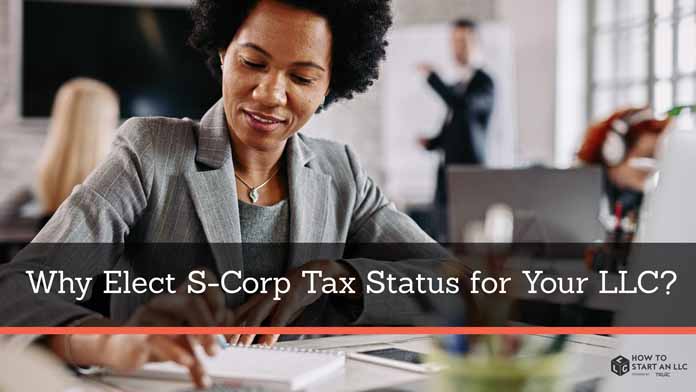Why Elect S Corp Tax Status for Your LLC?
An S Corporation (S corp) is a tax classification available to corporations and limited liability companies (LLCs).
Being an LLC taxed as an S corp offers tax benefits that could save you money under the right circumstances.
Pro Tip: Get a free consultation with a tax professional to determine if an S corp is right for you.

What is an S Corp?
Unlike a limited liability company (LLC), partnership, or C corp, an S corp isn’t actually a business entity. Instead, it is a tax designation that can be applied to a business. LLCs and corporations can both elect to be taxed as an S corp, provided they meet certain criteria.
Benefits of Being an LLC Taxed as an S Corp
The difference between an LLC and an S corp is that S corp status allows business owners to be treated (for tax purposes) as employees of the business.
This can greatly reduce a business owner’s tax burden under the right circumstances, saving them on self-employment taxes (social sercurity and medicare).
Learn more about S corp requirements in our What is an S Corp guide.
The Default Tax Structure for an LLC
For tax purposes, a single-member LLC is classified as a disregarded entity and a multi-member LLC is classified as a partnership by default.
Single-Member LLC Taxes
Like a sole proprietorship, a single-member LLC is taxed as a disregarded entity by default. This means the IRS ignores the structure of your business and taxes you like it does any individual. The LLC’s income is reported on your personal tax return at the end of the year.
Multi-Member LLC Taxes
A multi-member LLC is taxed as a partnership. This means LLCs do not pay any income taxes to the IRS and all profits are passed through to the members of the LLC. The members pay the taxes to the IRS on their individual tax return.
Pass-Through Entities
Both default tax structures (disregarded entity and partnership) are considered pass-through entities. This means that the company’s profits are not taxed at the corporate level, but are instead passed through to the company’s owners.
The owners of pass-through entities are responsible for paying personal income tax on their share of profits. They are also responsible for paying self-employment tax to cover both the employee and employer portion of Social Security and Medicare taxes. The current self-employment tax rate is 15.3%.
How an LLC that Elects S Corp is Taxed
Unlike disregarded entities and partnerships, S corp owners can save money on employment taxes by distributing their earnings to members and passive shareholders.
As long as they have an active role in the day-to-day operations of the business, the owner of an S corp is considered an employee of the company. Owners of an S corp must be paid a “reasonable” salary (earned income) based on their position and industry, with the remainder of business profits distributed as dividends.
Example: Jennifer owns a Single-Member LLC that makes an annual profit of $125,000 and is taxed as an S corp. As an employee, Jennifer paid herself a reasonable compensation of $75,000. She then took the remaining $50,000 as a distribution from her business. Because distributions are not subject to employment taxes, Jennifer saved $7,650 in Social Security and Medicare taxes.
Advantages of an S Corp
A major advantage of an S corp is that unlike standard C corporations, S corporations are not “double-taxed.” Additionally, because the owners of S corps are considered employees of the company, they can save thousands on employment taxes. Any money remaining in the business at the end of the year can be distributed to active shareholders as dividends. This lowers the business owners’ total tax obligations.
Disadvantages of an S Corp
An S corporation may invite closer scrutiny from the IRS because it uses a more complex tax designation than a single-member LLC or partnership. This complexity can lead to more accounting or filing mistakes, which can result in the IRS stripping a business of its S corp status. If you choose this status, it’s critical to abide by all IRS regulations.
Another disadvantage of the S corp status is that it limits the number of shareholders your business can have. If you plan to attract investors early on in your business, it probably makes the most sense to start as a C corporation.
Qualifications for an LLC to Be Taxed as an S Corp
One of the benefits of an LLC is that it has some flexibility in how it is taxed. While the default is to tax an LLC as a disregarded entity or a partnership, your LLC may qualify for S corp tax designation.
Few restrictions exist for LLC ownership. Generally, there’s no maximum number of members permitted in an LLC and no citizenship requirements. An LLC can also be owned by other business entities such as corporations or other LLCs. In contrast, to qualify for S corp status, your business cannot have more than 100 owners, all owners must be U.S. citizens or permanent residents, and no other business entities may be owners.
Pro Tip: Get a free consultation with a tax professional to determine if an S corp is right for you.
How Does the Tax Cuts and Jobs Act Affect My LLC?
Section 199A of The Tax Cuts and Jobs Act of 2017 provides qualifying business owners of pass-through entities with a 20 percent deduction of their income. This essentially means that your income taxes are reduced by 20 percent. The law specifically stipulates this deduction on qualified business income, which is the net profit your business earns during the year. If you elect S corp status, the deduction will not apply to profits paid out as wages. For more details on how this may or may not work for your business, see the IRS’s FAQ page or speak with a tax professional.
When to Choose S Corp Status for Your LLC
Choose S Corp Status if:
- You’re a well-established business owner and know how much profit you’re making each year.
- You already deal with the formalities that come with S Corp statuses, such as bookkeeping and payroll requirements.
- Your business is earning enough to save money with S corp status even after paying the “reasonable salary.”
Choose Default Tax Status if:
- You’re an entrepreneur just starting out and are uncertain of how much profit you’ll make each year.
- You don’t want to deal with formalities such as bookkeeping and payroll requirements.
- Your business isn’t earning enough to save money with S corp status.
How to Elect S Corp Status for Your LLC
Electing S corp status for your LLC is a fairly simple process, provided that you already meet the ownership requirements. If your business qualifies, all you have to do is file IRS Form 2553 before March 15, and your LLC will be taxed as an S corp for the current tax year.


